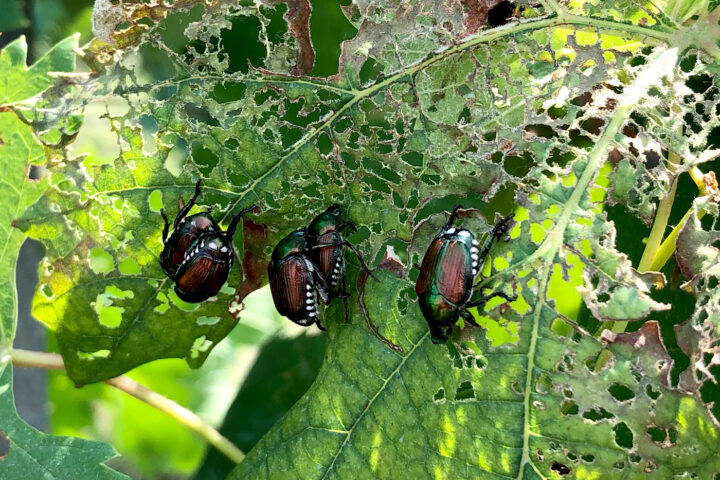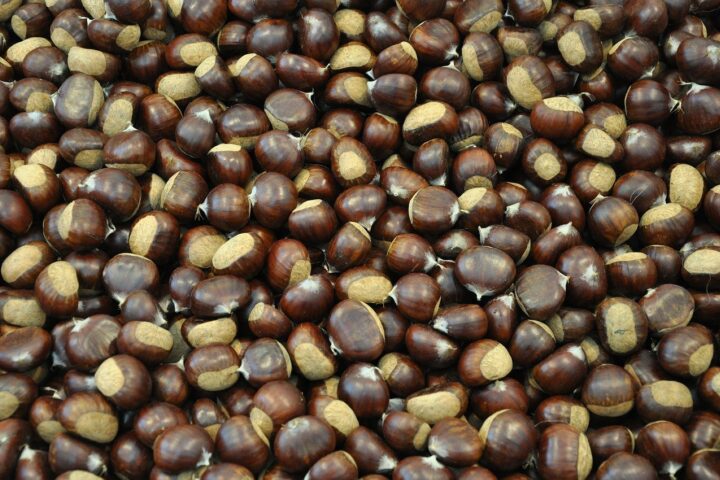
Traveling Japanese beetle threatens native plants
The Japanese beetle was first discovered in Switzerland in 2017 in Ticino. Now it has made it to the northern side of the Alps. After being found in Basel-Stadt and Solothurn, a larger population of the beetles has been found in Kloten for the first time. They are controlled with traps, but also pesticides.
Wednesday, August 9, 2023
In brief:
- The Japanese beetle is spreading in Switzerland.
- It poses a major threat to native crops.
- Its effective control is currently only possible with emergency approvals for pesticides.
As reported by the "Neue Zürcher Zeitung", four Japanese beetles were spotted in an attractant trap in the municipality of Kloten in mid-July. The authorities immediately deployed 40 people to check traps and set new ones. Afterwards, it became clear that the specimens found were not isolated cases.
First population north of the Alps
The first population of Japanese beetles north of the Alps has established itself in Kloten. To stop them spreading to other regions, the authorities are using insecticides against the Japanese beetle in a concerted effort. This is because, as long as the beetles have not laid eggs, they can be easily and efficiently controlled with insecticides, according to entomologist Giselher Grabenweger of the Agroscope Research Station. The insecticides used by the authorities in Kloten have therefore been given temporary emergency approval. In addition, a ban on watering lawns and green areas applies until the end of September, as the Japanese beetle prefers to lay its eggs in wet soil. The control action in Kloten shows how important plant protection products are, also against the background of the increasing dangers posed by invasive pests.
Major threat to agriculture
More than 100 years ago, Japanese beetle grubs were introduced to America with flower bulbs. Since then, it has caused great damage there and must be controlled at great expense. The beetle attacks the leaves of various trees (e.g. apple, elm, lime, maple, peach), shrubs (e.g. grape berry, blackberry, rose) and other plants (e.g. corn, soybean). In the process, the Japanese beetle sometimes eats the plants bare except for the twigs and leaf skeletons. In the summer of 2014, the beetle was discovered for the first time on the European mainland near Milan. Three years later, it was detected for the first time in southern Ticino through traps set as a precaution. The beetle can travel several hundred meters under its own power. Or it is transported unnoticed over long distances by cars and trucks. The FOAG therefore urges vacation travelers to exercise caution. If possible, luggage and vehicle should be searched for the Japanese beetle on the return trip.
Invasive pests on the rise
Controlling the Japanese beetle is difficult. This is because the beetle has no natural enemies in Switzerland. A large-scale spread of the Japanese beetle would have major ecological and economic consequences. In 2020, Swiss Post, in collaboration with the Federal Plant Protection Service, presented a special stamp with an illustration of the Japanese beetle to mark the Year of Plant Safety. With this, it wanted to make the population aware of the danger of pests and plant diseases.
Not only insects like the Japanese beetle, but also invasive plants and plant diseases are on the rise all over the world. This has to do in particular with the ever-increasing movement of people and goods. Climate change is further exacerbating the problem, as pests suddenly feel at home in areas that were previously too cold for them. Research into new crop protection products will therefore remain central to protecting domestic agriculture and biodiversity in the future.
Image: The Japanese beetle on the special stamp for the Year of Plant Protection (Source: Swiss Post 2020).
Sources
Neue Zürcher Zeitung, July 25, 2023
Federal Office for Agriculture FOAG: Quite dangerous Japan beetle. (in German)
Strickhof: The Japanese beetle (in German)
Kindly note:
We, a non-native editorial team value clear and faultless communication. At times we have to prioritize speed over perfection, utilizing tools, that are still learning.
We are deepL sorry for any observed stylistic or spelling errors.
Related articles

Invasive pests travel with us
Invasive pests and plant diseases are among the greatest challenges for biodiversity and agriculture. They often enter Switzerland via travel and imported goods and cause great damage to cultivated and wild plants. Since 2020, the import of plants from non-EU countries is prohibited. However, introduced pests are a worldwide problem.

Report the invasive Japanese beetle immediately!
The voracious Japanese beetle is threatening to spread in Switzerland. It was introduced to Switzerland four years ago and was first discovered in the canton of Ticino. To prevent the spread of the pest, the Agroscope research centre is working together with the people of Ticino. An innovative tool is being used to enable the rapid reporting of any discoveries of the Japanese beetle.

Invasive species threaten native plants
The economic interdependence of the world has increased greatly over the past years and decades. Due to the brisk trade activity between the continents, invasive plant and animal species are also spreading faster and faster. This can lead to serious problems for native vegetation and agriculture. According to the FOEN, the canton of Ticino is particularly affected.

‘No genetic engineering’ is simply not an option!
For years, politicians and environmental organisations have been stirring up unnecessary fears about a technology that has been helping to conserve resources and protect the environment for decades, while improving the quality and tolerability of food and cosmetics. It is time to put an end to this consumer deception.

«The protection of cultures is no longer guaranteed»
Swiss agriculture is in a tight spot when it comes to crop protection. At the Swiss-Food Talk on July 1, 2025, three producer representatives described how bans, the lack of alternatives, and lengthy approval procedures are putting pressure on their crops.

Chasing Misinformation Feels Like Herding Cats
Science fiction has a way of masquerading as science fact — until someone like me comes with a bucket of cold, hard evidence. But let’s be real: debunking nonsense takes exponentially more effort than producing it. Jonathan Swift knew it in 1710, and here I am, centuries later, still speaking my truth before the next viral misinformation dumpster fire.

Climate protection must not jeopardise food security
Agriculture is increasingly under pressure to become climate-neutral. But how can this be achieved without jeopardising food security? In the agricultural policy podcast, Hannah von Ballmoos-Hofer, head of the energy division at the Swiss Farmers' Union, emphasises that climate protection is important, but must not come at the expense of food security.

